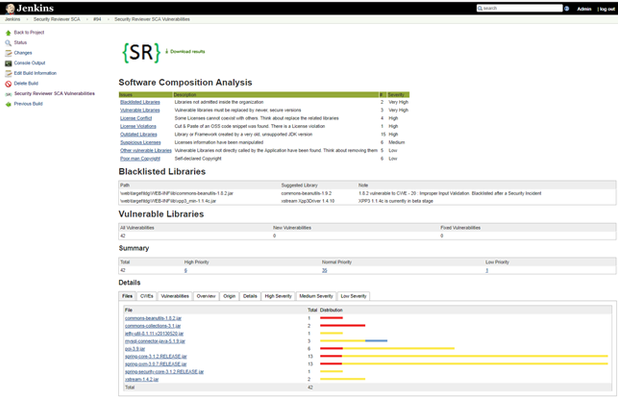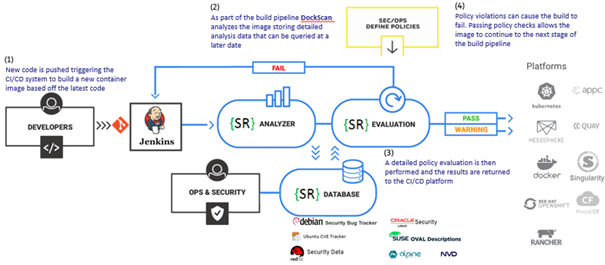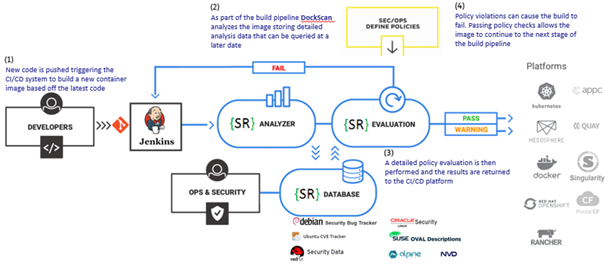| Table of Contents |
|---|
| Table of Contents |
|---|
Security Reviewer – Software Composition Analysis (SCA) identifies project dependencies on 3rd-parties components directly inside your SDLC, as Jenkins Plugin, Bamboo Plugin or using the CLI Interface. Security Reviewer – Software Composition Analysis It is able to identify Java, C/C++, Ruby, Groovy, Perl, PHP, JavaScript, TypeScript, Python, Rust, Scala, GO, R, Kotlin, Clojure, ErLang, Shell, PowerShell, LUA and Auto-IT components along with .NET assemblies and Objective-C, Objective-C++, SWIFT support. Once identified, SCA will automatically determine if those components have known, publicly disclosed, vulnerabilities as well as licenses-related issues.with .NET assemblies and Objective-C, Objective-C++, SWIFT support. Once identified, SCA will automatically determine if those components have known, publicly disclosed, vulnerabilities as well as licenses-related issues.
Software Composition Analysis Desktop, Jenkins and Bamboo native plugins and CLI Interface (test on many CI/CD platforms) provide a 360 degrees solution covering all your DevOps needs. 3rd-party libraries can be analyzed (Open Source Analysis-OSA) using a shared folder located on Network File System (NFS), a Nexus Repository or JFrog Artifactory for discovering Vulnerable Libraries, Vulnerable Frameworks, Blacklisted/ Discontinued/ Outdated / Obsolete/ Deprecated libraries and frameworks. Legal issues like: Blacklisted Licenses, Licenses Conflict, No-licensed libraries, Suspicious (modified) licenses and Poor-man Copyrights are fully-detected from the tool.
Dashboards
Security Reviewer SCA can publish results to a bunch of Dashboards like: OWASP Dependency Track, Kenna Security, CodeDx, Micro Focus Fortify SSC, SonarQube and ThreadFix, as well as to your preferred Defect Tracker (JIRA, BugZilla, etc.).
Anchor analyzers analyzers
Analyzers
| analyzers | |
| analyzers |
...
Analyzer | File Types Scanned | Analysis Method |
SRslic ** | ASP, ASPX, HTML, JSP, JSF, JAVA, C#, VB.NET, C, CPP, H, HPP, M, MM, SWIFT, PHP, JS, TS, RB, GROOVY, GY, PY, PERL, PL, SCALA, GO, R, KT, CLJ, ERL, SH, PS1, AU3, LUA, XML files | Reveals Licenses in Whitelist, Licenses in Blacklist, License Conflicts, Suspicious Licenses, License Violations and Poor’s man copyrights found in source code. |
Artifactory | jFrog Artifactory | Analyzer which will attempt to locate a dependency on a jFrog Artifactory service by SHA-1 digest of the dependency. |
Archive | Zip archive format (*.zip, *.ear, *.war, *.jar, *.sar, *.apk, *.nupkg); Tape Archive Format (*.tar); Gzip format (*.gz, *.tgz); Bzip2 format (*.bz2, *.tbz2) | Extracts archive contents, then scans contents with all available analyzers. |
Assembly | .NET Assemblies (*.exe, *.dll) | Uses GrokAssembly.exe, which requires .NET Framework or Mono runtime to be installed, otherwise .NET Assemblies will be analyzed by FileInfo and NuSpec analyzers only. |
Packrat | CRAN | packrat.lock files (R language). |
RetireJS | JavaScript | It uses the manually curated list of vulnerabilities from the RetireJS community along with the necessary information to assist in identifying vulnerable components. Vulnerabilities documented by the RetireJS community usually originate from other sources such as the NVD, OSVDB, NSP, and various issue trackers. |
CMake | CMake project files (CMakeLists.txt) and scripts (*.cmake) | Regex scan for project initialization and version setting commands. |
MSBuild | .NET Assembly | Analyzes MSBuild Projects |
MavenGradleAnt | Analyze Maven, Ant and Gradle build files for Java | Analyze pom.xml, build.gradle, and build.xml. |
GoDep | Analyze GitHub dependency files for GO Language, .go | Analyze vendor.conf, godeps.json, godeps.json gomod files, and gopkg.toml. |
Jar Analyzer | Java archive files (*.jar); Web application archive (*.war) | Examines archive manifest metadata, and Maven Project Object Model files (pom.xml). |
NSP | Node Security Project is used to analyze Node.js’ package.json files for known vulnerable packages. | Recently acquired by NPM inc., this service will be still available until September, 30. |
| SNYK | JavaScript, .NET, Java, TypeScript, Python, Ruby, Scala, GO | Scans scripts and dependencies |
Nuspec | Nuget package specification file (*.nuspec) | Uses XPath to parse specification XML. Analyze also packages.config and (*proj or sln), project.lock.json and project.assets.json or PackageReference. |
OpenSSL | OpenSSL Version Source Header File (opensslv.h) | Regex parse of the OPENSSL_VERSION_NUMBER macro definition. |
Ruby bundler‑audit | Ruby Gemfile.lock files | Executes bundle-audit and incorporates the results into the dependency-check report. |
Autoconf | Autoconf project configuration files (configure, configure.in, configure.ac) | Regex scan for AC_INIT metadata, including in generated configuration script. |
CocoaPods | CocoaPods .podspec and podfile.lock files | Extracts dependency information from specification file and lock file, for Objective-C and SWIFT projects. |
Composer Lock | PHP Composer and PHP Pear | Parses PHP Pear package.xml, PHP Composer lock and composer.json files for exact versions and dependencies. |
Node.js | NPM package specification files (package.json) | Parse JSON format for metadata. |
Python Metadata | Python source files (*.py); Package metadata files (PKG-INFO, METADATA); Package Distribution Files (*.whl, *.egg, *.zip) Anaconda and environment.yml | Regex scan of Python source files for setup tools metadata; Parse RFC822 header format for metadata in all other artifacts. Also scans dependencies in yml files. |
FileInfo-JarManifest** | jar, war, ear, dll, exe, lib, shared libs and machOS, UPX, PE executables | Reveals Blacklisted Libraries, Outdated Libraries, Other Vulnerable Libraries. |
Ruby Gemspec | Ruby makefiles (Rakefile); Ruby Gemspec files (*.gemspec) | Regex scan Gemspec initialization blocks, Rakefile and gemfile.lock for metadata. |
SWIFT | SWIFT Package Manager’s Package.swift | Extracts dependency information from swift package file. |
**awesome-C, awesome-CPP, cppreference, awesome-dotnet, awesome-javascript, awesome-typescript, SwifterSwift, Three20, PyPi, awesome-scala | Fresh updated lists of best (awesome) libraries, packages and frameworks, specialized for each Programming language | Seeks for new and updated libraries, packages and frameworks coming directly from programmer’s community. |
SBT | SCALA | Scans build.sbt for dependencies. |
| CRAN | R | Scans for add-on packages from CRAN |
| Akku.scm | R | Scans a Scheme from Akku.scm |
CPAN | Perl | Analyze dependencies in Makefile.PL. |
| Leiningen | Clojure | Scans Lein scripts |
| LuaRocks | LUA | Scans rocks packages |
ERL | Erlang | Analyze dependencies in rebar.config. |
| Rust | Rust | Scans cargo.toml file |
| au3pm | Auto-IT | Scans json.au3 |
| Bower | JavaScript | Scans bower.json |
| Chocolatey | Windows Packages | Scans c4b files |
| Clojars | Clojure | Scans Lein scripts and Cloure JAR files |
| Conan | C/C++ | Scans makefile |
**Security Reviewer’s SCA unique features
Package Managers
SCA supports several Package Managers.
...
- As Security Reviewer integrated module. After Static Analysis completion, a complete application dependency report on 3rd-party libraries/frameworks will be available
- As Jenkins or Bamboo plugin, it features the ability to perform a Software Composition Analysis build and later view results post build. The SCA Plugin is built using same features that the static analysis plugins offer, including thresholds, charts and the ability to view vulnerability and license information should a dependency have one identified
- Full-tested integrations with Azure DevOps, Travis CI, Circle CI, TeamCity, CodEnvy, Chef, Ansible, Nexus, AnthillPro, GoCD, among others. Those dependencies can be scan inside your preferred Container System like Docker, Kubernetes, OpenShift, MesoSphere, Rancher, Quay, Singularity, Pivotal CF and any container compliant to APPC specifications
Open source software (OSS) or free and open source software (FOSS) is computer software for which the human-readable source code is made available to the public under license terms permitting the study, modification, and distribution of the software to anyone and for any purpose. The “free” of FOSS refers to the liberty to study, modify and distribute – it does not require that it be made available without cost. The fact that OSS and FOSS can be studied, modified and distributed has created open source communities in which developers continually modify, enhance and troubleshoot the software and contribute these changes back to the community. As a result, the vast majority of enterprises use OSS components in their own proprietary software applications. Doing so brings a host of benefits, including accelerating development time, reducing costs and producing more stable and secure code. While the use of OSS has seen a significant increase over the last 10 years, compliance with the OSS license terms often has not kept up. Many users who download an OSS component may not appreciate that doing so obligates them to abide by a specific software license associated with its use. Unlike commercial software applications or software-as-a-service (SaaS) offerings, click-through acceptance of OSS license terms and conditions are not typically required to gain access to the OSS code. Instead, the license terms are merely referenced on the download site or embedded in a text file within the download package. While there are hundreds of different OSS licenses, they can be broken down into a small subset of license types. They range from: the most permissive licenses, such as Berkley Software Distribution (BSD), MIT and Apache, which permit almost any use of the OSS component and simply limit warranties and disclaim liabilities; to weakly protective licenses, such as the Mozilla Public License (MPL); to the most restrictive “copyleft”-style licenses, such as the GNU General Public License (GPL) or the GNU Lesser General Public License (LGPL). Copyleft licenses can require that any software with which they are packaged must also be distributed under the same copyleft license terms. Use of the more restrictive licenses can therefore have a viral effect, requiring disclosure of, and permitting third parties to use, the source code of one’s own proprietary code. Further, different licenses impose different requirements on modification and distribution of the OSS component. For example, the LGPL license requires users to distribute the source code (or otherwise make it available) if they distribute the OSS component to third parties. Other license types require that users identify changes they have made to the OSS component in a header or other text file included in the distribution package.
...
Security Reviewer – Composition Analysis module can scan your software code and, using sophisticated pattern matching matching algorithms, identify the various OSS components present in your software code. While some vendors require that source code be uploaded to their cloud environment for processing, Security Reviewer can operate entirely on-premises and using hashed values of the source code to avoid the risk of source code disclosure outside the enterprise. Unless an enterprise is in the early stages of its development process or has kept an accurate running list of OSS components, the automated process will be far more accurate and complete. Further, in more and more significant financing and M&A transactions, the investors or acquirers themselves are using such automated tools as part of the due diligence process, so to simply assume that the manual inventory process will be “good enough” may be misguided. Representing compliance and possession of an accurate list of OSS components, only to later find out from a counterparty using an automated tool that this is not the case, can be just as bad, if not worse, than not having completed an audit at all.
...
-- Debian Security https://security-tracker.debian.org
-- Linux Security https://linuxsecurity.com/
-- RedHat Security https://access.redhat.com/security
-- Oracle Security Advisory https://www.oracle.com/technetwork/security-advisory
-- SuSe OVAL Descriptions https://www.suse.com/support/security/oval/
-- Ubuntu CVE Tracker https://people.canonical.com/~ubuntu-security/cve/main.html
-- Alpine Linux Security https://alpinelinux.org
-- CentOS Security https://www.centosblog.com/categories/security/
-- Microsoft Security Response Center https://portal.msrc.microsoft.com/en-us/security-guidance
-- OSS Index by Sonatype: https://ossindex.sonatype.org/
-- NVD by NIST: https://www.nist.gov/programs-projects/national-vulnerability-database-nvd
-- VulnDB: https://vuldb.com/
-- Maven Central: https://mvnrepository.com/repos/central (Java, Scala, Kotlin)
-- NuGet Packages: https://www.nuget.org/packages (.NET)
-- PyPy compatibility: https://bitbucket.org/pypy/compatibility/wiki/Home (Python)
-- Common Weakness Enumeration (CWE): http://cwe.mitre.org/
-- CVE Details: https://www.cvedetails.com/
SCA uses the following community-driven 'Awesome' lists too:
-- Awesome Java https://github.com/akullpp/awesome-java
-- Awesome .NET https://github.com/quozd/awesome-dotnet
-- Awesome Android https://github.com/JStumpp/awesome-android
-- Awesome C libraries https://github.com/kozross/awesome-c
-- Awesome C++ https://github.com/fffaraz/awesome-cpp
-- Awesome JavaScript https://github.com/sorrycc/awesome-javascript
-- Awesome TypeScript https://github.com/dzharii/awesome-typescript
-- Awesome Python https://awesome-python.com/ and https://pythonawesome.com
-- Awesome Ruby https://github.com/markets/awesome-ruby
-- Awesome Scala https://github.com/lauris/awesome-scala
-- Awesome GO https://github.com/avelino/awesome-go
-- Awesome PHP https://github.com/ziadoz/awesome-php
-- Awesome Swift https://github.com/matteocrippa/awesome-swift
-- Awesome iOS https://github.com/vsouza/awesome-ios
-- Awesome Kotlin https://github.com/KotlinBy/awesome-kotlin
-- Awesome Groovy libs https://github.com/kdabir/awesome-groovy
-- Awesome shell scripts https://github.com/alebcay/awesome-shell
-- Awesome R https://awesome-r.com
-- Awesome PowerShell https://github.com/janikvonrotz/awesome-powershell
-- Awesome Auto-It https://github.com/J2TeaM/awesome-AutoIt
-- Awesome LUA https://github.com/LewisJEllis/awesome-lua
-- Awesome Clojure https://github.com/razum2um/awesome-clojure
-- Awesome Erlang https://github.com/drobakowski/awesome-erlang
-- Awesome Rust https://github.com/rust-unofficial/awesome-rust
Further, SCA uses the libHunt service:
-- Java https://java.libhunt.com/
-- .NET https://dotnet.libhunt.com
-- Android https://android.libhunt.com/
-- C/C++ https://cpp.libhunt.com/
-- JavaScript/TypeScript https://js.libhunt.com/
-- Python https://python.libhunt.com
-- Ruby/Groovy https://ruby.libhunt.com/
-- Scala https://scala.libhunt.com/
-- GO https://go.libhunt.com/
-- PHP https://php.libhunt.com/
-- Swift https://swift.libhunt.com/
-- iOS https://ios.libhunt.com/
-- Kotlin https://kotlin.libhunt.com/
-- Rust https://rust.libhunt.com/
Regarding the license/legal issues, like Blacklisted Licenses (Strong CopyLeft included), License Conflict, License Violations, Suspicious Licenses (modified and missed licenses), Poor-man CopyRight, SCA uses the following external data sources:
-- SPDX: https://spdx.org/
-- Open Source Initiative: https://opensource.org/licenses
-- GNU compatible license list: http://www.gnu.org/licenses/license-list.html
-- Creative Commons: https://creativecommons.org/share-your-work/licensing-considerations/compatible-licenses/
-- Comparison of FOSS licenses: https://en.wikipedia.org/wiki/Comparison_of_free_and_open-source_software_licenses
-- FLOSS license chart: https://dwheeler.com/essays/floss-license-slide.html
COPYRIGHT (C) 2014-2021 SECURITY REVIEWER SRL. ALL RIGHTS RESERVED.


